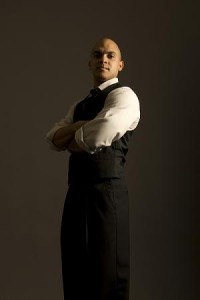Irvin Mayfield loves similes.
When contrasting listening to a record versus attending a concert, he says, “It’s like watching the Food Network and then going to the restaurant and eating that dish.” When discussing the dynamics of playing as a collective group of jazz musicians, he says, “It’s like sex. Just because one guy has an idea and you have an idea doesn’t mean it works together. There’s a lot of instinctual things that have to have to be developed.” When speaking of Duke Ellington’s brilliance, he says, “Duke Ellington is like America’s Beethoven. He is to American music what Beethoven is to European music.” Finally, when contrasting the difference between the recent Delfeayo Marsalis rendition of Such Sweet Thunder and the New Orleans Jazz Orchestra (NOJO) version he explains, “It’s like a band getting together and recreating Beethovens Fifth. [Marsalis] created a re-imagined interpretation. We’re playing Beethoven’s Fifth.”
These figurative devices pepper his speech during a conversation about Mayfield’s next concert series event. On a freezing Thursday morning, Mayfield transforms a phone interview about Duke Ellington’s Such Sweet Thunder into a meditation on the relationship between romance, art and technique. Mayfield, the founder and artistic creator of the NOJO, chose the Shakespearean-inspired score for NOJO’s Valentine’s Day concert. The concert at the Contemporary Arts Center will be an acoustic presentation performed by some of New Orleans’ best jazz musicians. The only mic in the house will belong to Harry Shearer, who will read a sonnet in between songs.
To understand the genius of Such Sweet Thunder, imagine the task of summarizing Shakespeare’s entire body of work into twelve short essays, then transforming those summaries into a jazz composition. Mayfield cracks up when describing the ridiculous undertaking. Ellington executed this translation so perfectly that the number of notes in each composition corresponds to the number of lines in a Shakespearean sonnet. Ellington created technical arrangements of characters and instances. Furthermore, the work balances the playing time of each instrument so that all sections of the orchestra play for the same amount of time.
“Duke Ellington was a genius,” Mayfield says several times. “He was one of the greatest artists who ever have lived. There’s only 12 notes in a scale. When you look at what he’s done with those notes–that’s the definition of romance. It’s beautiful.”
Thus, Duke Ellington’s Such Sweet Thunder becomes the launching pad for a ten-minute contemplation on romance and music. While he describes Such Sweet Thunder, Mayfield equates love to artistry. “Music is just the transformation of love into something else,” Mayfield says. “Faulkner, Hemingway, Duke Ellington, Louis Armstrong, Shakespeare–great artists transform love into another type of a product. That’s why people get close to art. Art is romance. It’s the best of who we are as people.”
Mayfield’s smooth voice continues. “Get close to a great book, great music, a great dish, or a great piece of architecture–it can remind us of the important things in life when you whittle it down–when you distill it to the most important thing. That is love,” he says. “Valentine’s Day just gives us an opportunity to center a discussion about it. What we do on a daily basis at the New Orleans Jazz Orchestra is love.”
Mayfield’s concept that art transforms love into something else–such as sound, in the case of music–reflects the goals of NOJO, his eight-year-old jazz orchestra. The musicians devote their time to going beyond their strong technique to explore great jazz scores–and doing it so well that they nabbed a Grammy last year. After their album’s success and a tour, NOJO has brought jazz back home to New Orleans.
Somehow, in the entire history of the birthplace of jazz, there hasn’t been a ticketed concert series until NOJO’s run this year. Mayfield wants his orchestra to be the New Orleans version of the New York Philharmonic. A professional jazz orchestra like NOJO reemphasizes the importance of craftsmanship in music–that it is imperative to understand structure and evolution of music. Mayfield compares the importance of quality technique in jazz to writing a novel–if a novel is written badly, no one cares about the ideas in it. Mayfield believes that musicians sometimes throw out technique, thinking that technique robs them of an artistic experience.
“That’s just bullshit,” says Mayfield.
The event is February 14 with 7 p.m. & 9 p.m. shows at the Contemporary Arts Center. Tickets are $25 and $20 for CAC members and are available at cacno.org and at the CAC Box Office.





